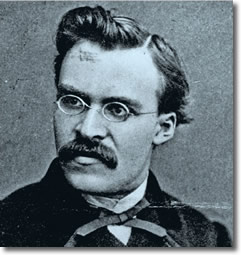Rad note » this entry originated from another page. It was moved here because the subject drifted far enough to warrant its own, separate page, which lets me focus on and reference more easily the concepts under discussion here.
At the end of this entry (that you're reading now) I have included a link that will return you to the exact place from where this entry originated. Here ya go ...
» Waxing Existential
Since the minute I received the call from my doctor, and especially in the minutes immediately after that moment .. when he told me that I had cancer ..
.. uh, I have been in a very 'existential' state of mind. An existential mood, you might say. But what does that mean?
You cant really help it, you know. You are where you are. You cannot pretend that you are not when you are .. can you?
Both Dostoevsky & Nietzsche, whom I find 'interesting' .. both of them are existentialists.
So this might be a good place for me to discuss my thoughts and views and feelings on the subject. And maybe do a little exploring. Turn over stone or two. Detour down some cobblestone back-alleys at midnight.
Kierkegaard (1813-1855) is generally considered the father of Existentialism. This page says that he might even be the father of modern psychology, too. Quotes. More quotes.
He is probably best known for » Fear & Trembling (1843). More.
Kristen the singer was the one who introduced me to Kierkegaard, who she sorta adopted as her personal religion, so to speak.
On the one hand, the word itself seems so pretentious. Does it not? Existentialism. So full of itself. Which may be part of the reason why I have never researched the topic itself very much (philosophically speaking.)
I only know that there is a strong resonance with some of (many of?) the things that these people have said and done. Tho these people do not seem pretentious at all, do they?
It's difficult to wax pretentious when you're getting your ass kicked.
Here is part of the first paragraph on Existentialism from Wikipedia »
.. late 19th- and 20th-century philosophers who, despite profound doctrinal differences shared the belief that philosophical thinking begins with the HUMAN subject--not merely the thinking subject, but the ACTING, FEELING, LIVING human individual.
In existentialism, the individual's starting point is characterized by what has been called "the existential attitude", or a sense of disorientation and confusion in the face of an apparently meaningless or absurd world
Many existentialists have also regarded traditional systematic or academic philosophies, in both style and content, as too abstract and remote from concrete human experience.
Okay, after reading the first paragraph, I am already feeling them .. and how they see things .. how they tend to make sense out of the barrage of information that we humans receive here in the 21st century.
[ We're in the Third Millenium, dawg. The Third Millenium. ]
<ignore this intentional body-text marker>
••• today's entry continues here below •••
Meaningless-ness Makes Me Feel » Disoriented & Confused
Notice, in particular, the this passage » "the existential attitude" [is] a sense of disorientation and confusion in the face of an apparently meaningless or absurd world.
And I thought of the times that my son would go back to his mom .. after we had an especially cool and fun time together ..
.. and how lost and disoriented I sometimes felt afterwards. [ Maybe every 4th time he went back. ]
 And I can see that it was because my existence had become meaningless (temporarily). For a few hours.
And I can see that it was because my existence had become meaningless (temporarily). For a few hours.
For several days, he was my complete focus. Then he was gone.
Like that. Like you snapped your finger.
Very disorientating. And I could never figure out why.
So I could try to make it stop .. cuz it such an unpleasant feeling. A horrible feeling. Very intense.
Even knowing [ from much experience ] that the yucky feeling would only last 2 or 3 hours .. even then it was still difficult to deal with.
I would walk around in a fog for a few hours. Sometime, I would be driving somewhere .. only to forget enroute where I was going. And would have to turn around and go home, feeling whacked out.
My resonance with existentialism and existentialist .. is part of the reason why I document my experiences (as a living, breathing, feeling human). Often right while I am actually, up in the experience itself, if possible. Or at least, on the same day.
For an existentialist, this gives a document added value. Because it brings the reader that much closer (chronoligically, perspective-wise) to the experience.
Distant memories are cool, for sure. But they do not have much to do with the existentialist. (I am speaking intuitively. Other existentialsts might think me full of shit.)
This is also why I try to be as honest with myself about my experiences as I can. Sure, people are very good at tricking themselves and letting themselves be tricked.
But I try to be honest in my characterization of the experience .. and how (in particular) it might have affected me, personally .. even if that experience was unpleasant.
Finding » Meaning in an Absurd World (Good Luck with That, Dawg)
On the subject of avoiding the "existential attitude" (angst?) by finding meaning in your sometimes absurd life .. let me say that .. trying to » stay alive .. does indeed give your life meaning. Certainly. Purpose. Plenty of it. Which is nice ..
.. because there are so many other things that the cancer patient lacks.
As I'm sure that finding enough food to keep your hungry tummy quiet .. also brings a special form of meaning to a life .. there in many third-world countries.
Do you find it at all absurd .. that I am rewarding myself for completing a "difficult" cancer treatment .. by treating myself to a biography about a nineteenth century Russian whose writings have been characterized as » 'dark' ..
.. and who wrotes books with titles such as » Crime & Punishment (1866), and Demons (1872, which Joseph Frank touts as » 'still the best novel on the subject of revolutionary conspiracy'.
I understand this myself, but when viewed from different perspectives, I can see how this does indeed carry a flavor of the absurd. I mean, you might expect me to reward myself with a trip to Disneyland .. "happiest place on earth." No?
You may have noticed this before, but it just occurred to me that .. I am attracted to things that deviate from my expertations .. even if I cant explain the deviation.
» Learning to Think for Yourself (with Original Thoughts)
Dostoevsky's time in a Siberian concentration camp (hard labor for 4 years), and his following 6 years in the military (also like me) in Siberia, which he hated .. taught him, I feel, to (rather, as opposed to what Hemingway might say) » think for himself.
 And yes, I am certainly surprised that I find myself differing with Hemingway ..
And yes, I am certainly surprised that I find myself differing with Hemingway ..
.. because there are so few places where I differ with him.
And so many where I agree.
And of course, there is the respect. For the artistic gift.
My only other source of difference with Hemingway involves the 'pacing' of the writer ..
.. where Hem works like clock-work.
Whereas I, when the spirit moves me .. I go for it .. and stay with it. "Off the clock," so to speak.
Yes, you pay for this. And yes, I am getting off topic, slightly. But sometimes there is no other way to get what lies out at your furthest (outer-most) reaches. No other way.
And I am certainly more experimental than Hemingway. And we-today have the advantages of technologies (both writing- and publishing-wise) he could only dream of.
This here is the reason why I am now far more comfortable with allowing myself to address rather distant thoughts and explore otherwise unhinged ideas ..
.. because these are often the very platforms from which I find myself using as springboards to other (even MORE cool) places.
Tho normally it is well after initial publication .. that I can return to these entries and add little, insightful points I have since gleaned .. because I have been more conscious of those things after writing about them.
The regular news writer cannot go back and add to a story .. at least not without commentary explaining the edit.
I feel like I have an advantage over the regular news writer, because over time, my documents can become enriched with the insights gleaned thru our eperiences thru the passing of the years.
Many times I return to simply add an exemplar-link to an article that illustates precisely what it was that I was trying to say.
The end. ■
You can return to the exact spot from where this entry originated .. see » here.
<ignore this intentional bottom text spacer, too>
